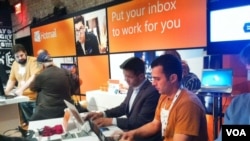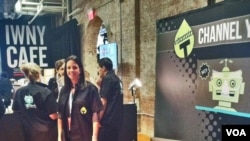The atmosphere is electric at Internet Week New York’s headquarters in the city's trendy Soho neighborhood, as computer programmers, artists, entrepreneurs, investors and journalists browse and compare notes on the latest trends in the Internet industry.
“I think that people who work in this industry are really, really vocal advocates for what they do," says Greg James of the global advertising agency, Cake. "There is a real passion about it. So you come to an event like this and you just feel in the room everyone wanting to talk to everyone else - people wanting to connect and learn more and really get onto the latest thing. So there is a sort of social one-upsmanship as well about this, which is great. You get that kind of competition and camaraderie.”
With so many different types of devices connecting to the Internet and with online content proliferating, advertisers have to be more creative than ever in competing for consumer attention, according to James.
“They have to almost turn their marketing into value and extensions of products and services a lot of the time," he says. "Because people don’t necessarily want you hitting them over the head, telling them, ‘Buy more of this, buy more of that.’ They want to say, ‘Why should I buy more of it? Why should I buy more of it from you in particular? What is your point of view in the world and how are you going to deliver it for me?’ So actually, the worlds of advertising and technology are very closely aligned now.”
Demand Media is a company that seems to embody that trend. It creates online articles, videos, slide shows and other online content for special interest websites and mobile phone users, and sells targeted advertising to companies that want to reach those niche consumers.
“We provide content that is health and fitness related as well as mobile applications to help you quit smoking, to track your daily intake of calories if you are looking to lose weight or eat more healthily," says Leyla Farah of Demand Media’s display. "And we provide a community around that as well. So if you need help or you need encouragement, you can get all that in one place.”
Farah’s company also publishes a popular instructional site Internet site called e-How that helps people with their home repair and other household projects as well as eHowMom, which caters to mothers.
According to Farah, their Cracked.com site - part magazine, part social medium, and part advertising revenue generator - is one of the most popular humor sites on the Web.
“The interesting thing about Cracked.com is the way the content gets produced," she says. "We actually have something we call a 'writers' room,' which has thousands of people pitching ideas into it and voting ideas up or down, so that we know that the ideas we’re going to write about already have gone through a process to vet them. Our audience has told us that before we even create the content.”
Some old fashioned trade show gimmicks can be found among Internet Week's high-tech displays. At the Vitamin T booth, there is colorful green candy, a photo booth and souvenirs.
“It draws people in to the booth. We are trying to get people to talk to us,” says Sharon Strauss says Vitamin T, a one-stop agency for “digital creatives” - the people who have flocked to Internet Week New York.
She explains how the year-old company does business.
"So an ad agency wins a brand new account and they are very excited to get this account, but they don’t have enough staff to handle that. So they come to us and they hire Web designers and copywriters and production designers and Web developers, and we place them to handle that project. It’s fun.”
In addition to the many small companies like Vitamin T, there are some industry giants here at Internet Week New York. Galileo Vieira is here to promote Hotmail. The pioneering free email service, founded in 1996 and acquired soon after by Microsoft, leads the industry with its 364 million registered users. But in recent years, critics have panned the service for its poor performance. Vieira wants to reintroduce Hotmail to this crowd.
“Many years ago, the product wasn’t up to what people expected," Vieira says. "We had a lot of issues. So concerns around spam, concerns around storage size of the in-box, performance overall. So over the last year and half, two years, we fixed most of those problems, and we are really good at the fundamentals today. In addition, we’re tackling new problems.”
For example, Hotmail engineers have developed a way to screen so-called “graymail" - bulk email that has been solicited, such as newsletters, discount offers and news alerts, but which can choke a user's in-box.
“So we are really out there to show off these features," Vieira says, "to tell folks, ‘We know what we did the past. We know why you folks aren’t using us, but give us a shot.”
The approximately 500 companies and 40,000 attendees in attendance make Internet Week New York one of the biggest fairs of its kind. The week's other offerings include mini-courses, the Webby Awards, art installations, lots of parties and seemingly endless networking -- online and face to face.
“I think that people who work in this industry are really, really vocal advocates for what they do," says Greg James of the global advertising agency, Cake. "There is a real passion about it. So you come to an event like this and you just feel in the room everyone wanting to talk to everyone else - people wanting to connect and learn more and really get onto the latest thing. So there is a sort of social one-upsmanship as well about this, which is great. You get that kind of competition and camaraderie.”
With so many different types of devices connecting to the Internet and with online content proliferating, advertisers have to be more creative than ever in competing for consumer attention, according to James.
“They have to almost turn their marketing into value and extensions of products and services a lot of the time," he says. "Because people don’t necessarily want you hitting them over the head, telling them, ‘Buy more of this, buy more of that.’ They want to say, ‘Why should I buy more of it? Why should I buy more of it from you in particular? What is your point of view in the world and how are you going to deliver it for me?’ So actually, the worlds of advertising and technology are very closely aligned now.”
Demand Media is a company that seems to embody that trend. It creates online articles, videos, slide shows and other online content for special interest websites and mobile phone users, and sells targeted advertising to companies that want to reach those niche consumers.
“We provide content that is health and fitness related as well as mobile applications to help you quit smoking, to track your daily intake of calories if you are looking to lose weight or eat more healthily," says Leyla Farah of Demand Media’s display. "And we provide a community around that as well. So if you need help or you need encouragement, you can get all that in one place.”
Farah’s company also publishes a popular instructional site Internet site called e-How that helps people with their home repair and other household projects as well as eHowMom, which caters to mothers.
According to Farah, their Cracked.com site - part magazine, part social medium, and part advertising revenue generator - is one of the most popular humor sites on the Web.
“The interesting thing about Cracked.com is the way the content gets produced," she says. "We actually have something we call a 'writers' room,' which has thousands of people pitching ideas into it and voting ideas up or down, so that we know that the ideas we’re going to write about already have gone through a process to vet them. Our audience has told us that before we even create the content.”
Some old fashioned trade show gimmicks can be found among Internet Week's high-tech displays. At the Vitamin T booth, there is colorful green candy, a photo booth and souvenirs.
“It draws people in to the booth. We are trying to get people to talk to us,” says Sharon Strauss says Vitamin T, a one-stop agency for “digital creatives” - the people who have flocked to Internet Week New York.
She explains how the year-old company does business.
"So an ad agency wins a brand new account and they are very excited to get this account, but they don’t have enough staff to handle that. So they come to us and they hire Web designers and copywriters and production designers and Web developers, and we place them to handle that project. It’s fun.”
In addition to the many small companies like Vitamin T, there are some industry giants here at Internet Week New York. Galileo Vieira is here to promote Hotmail. The pioneering free email service, founded in 1996 and acquired soon after by Microsoft, leads the industry with its 364 million registered users. But in recent years, critics have panned the service for its poor performance. Vieira wants to reintroduce Hotmail to this crowd.
“Many years ago, the product wasn’t up to what people expected," Vieira says. "We had a lot of issues. So concerns around spam, concerns around storage size of the in-box, performance overall. So over the last year and half, two years, we fixed most of those problems, and we are really good at the fundamentals today. In addition, we’re tackling new problems.”
For example, Hotmail engineers have developed a way to screen so-called “graymail" - bulk email that has been solicited, such as newsletters, discount offers and news alerts, but which can choke a user's in-box.
“So we are really out there to show off these features," Vieira says, "to tell folks, ‘We know what we did the past. We know why you folks aren’t using us, but give us a shot.”
The approximately 500 companies and 40,000 attendees in attendance make Internet Week New York one of the biggest fairs of its kind. The week's other offerings include mini-courses, the Webby Awards, art installations, lots of parties and seemingly endless networking -- online and face to face.








